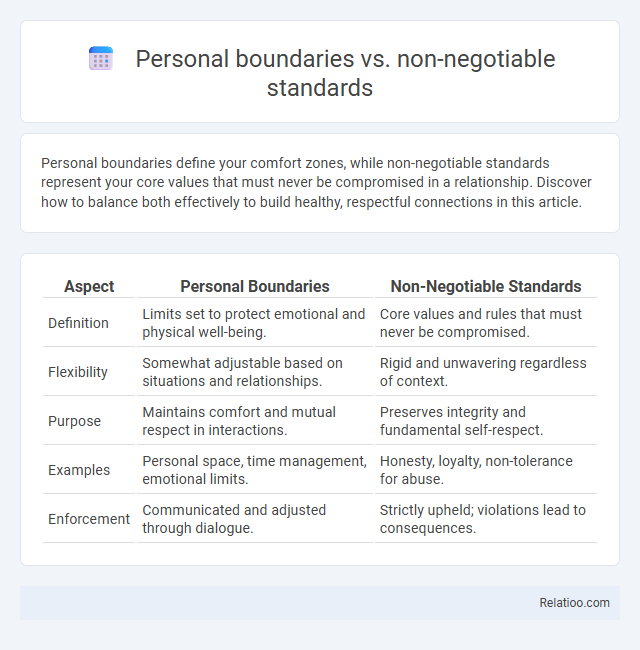Personal boundaries define your comfort zones, while non-negotiable standards represent your core values that must never be compromised in a relationship. Discover how to balance both effectively to build healthy, respectful connections in this article.
Table of Comparison
| Aspect | Personal Boundaries | Non-Negotiable Standards |
|---|---|---|
| Definition | Limits set to protect emotional and physical well-being. | Core values and rules that must never be compromised. |
| Flexibility | Somewhat adjustable based on situations and relationships. | Rigid and unwavering regardless of context. |
| Purpose | Maintains comfort and mutual respect in interactions. | Preserves integrity and fundamental self-respect. |
| Examples | Personal space, time management, emotional limits. | Honesty, loyalty, non-tolerance for abuse. |
| Enforcement | Communicated and adjusted through dialogue. | Strictly upheld; violations lead to consequences. |
Understanding Personal Boundaries
Understanding personal boundaries involves recognizing the limits that protect your physical, emotional, and mental well-being. Personal boundaries differ from non-negotiable standards, which are firm rules you set within relationships or environments, and from non-negotiables, which are absolute principles you refuse to compromise. Establishing clear personal boundaries empowers you to maintain respect and prevent emotional exhaustion while distinguishing what you can tolerate versus what is unacceptable.
Defining Non-Negotiable Standards
Non-negotiable standards represent the essential criteria and values that individuals uphold consistently, guiding behavior and decision-making without compromise. Unlike personal boundaries which protect emotional and physical well-being, non-negotiable standards serve as fundamental principles that define character and integrity. Establishing clear non-negotiable standards enables individuals to maintain self-respect and enforce accountability in personal and professional relationships.
Key Differences Between Boundaries and Standards
Personal boundaries define the limits you set to protect your emotional and physical well-being, while non-negotiable standards represent the minimal acceptable qualities or behaviors you expect from yourself and others in various areas of life. Non-negotiables are firm commitments that serve as deal-breakers, ensuring your core values and priorities are respected without compromise. Recognizing these distinctions helps you maintain healthy relationships by clearly communicating what is acceptable versus essential, aligning your interactions with your true needs and values.
Why Personal Boundaries Matter
Personal boundaries matter because they protect individual autonomy and emotional well-being, preventing others from overstepping and causing harm. Unlike non-negotiable standards, which are rigid rules often tied to core values or beliefs, personal boundaries are flexible limits that adjust based on context and relationships. Establishing clear personal boundaries fosters respect and healthy interactions, distinguishing them from non-negotiables that represent absolute principles.
The Importance of Setting Non-Negotiable Standards
Setting non-negotiable standards is crucial for maintaining personal integrity and fostering self-respect in all aspects of life. These standards serve as firm guidelines that define acceptable behavior and protect emotional and psychological well-being, distinct from flexible personal boundaries which can adjust based on context. Establishing clear non-negotiables reduces conflicts, improves relationships, and enhances decision-making by ensuring consistent adherence to core values.
Common Misconceptions About Boundaries and Standards
Personal boundaries often get confused with non-negotiable standards, but boundaries define your personal limits while standards reflect your expectations for others' behavior or situations. People mistakenly believe non-negotiable standards are flexible or interchangeable with boundaries, which can lead to blurred lines in relationships. Understanding that your personal boundaries protect your well-being, while non-negotiable standards uphold your values, helps you communicate clearly and maintain healthy interactions.
Signs Your Boundaries Are Being Crossed
Recognizing signs your personal boundaries are being crossed includes feeling consistently drained, disrespected, or pressured to compromise your values. Your non-negotiable standards represent core principles you refuse to breach, while non-negotiables are absolute limits essential to your well-being and integrity. Paying attention to physical discomfort, emotional distress, or a persistent sense of unease signals that your boundaries and standards require reinforcement.
How to Identify Your Non-Negotiable Standards
Identifying your non-negotiable standards starts with clearly defining the values and principles essential to your well-being and happiness, distinguishing them from personal boundaries that might be flexible depending on context. Reflect on situations where compromise negatively impacts your emotional or physical health, highlighting standards you must uphold without exception. You can ensure your relationships and decisions align with these standards by regularly assessing your reactions and setting firm guidelines that honor your core needs.
Strategies for Communicating Boundaries and Standards
Clearly defining your personal boundaries and non-negotiable standards helps establish respect and understanding in relationships. Use assertive communication techniques by stating your limits confidently and explaining the reasons behind them to reduce misunderstandings. Consistently reinforce these boundaries through calm but firm reminders, ensuring your expectations remain clear and respected.
The Impact on Relationships and Personal Growth
Personal boundaries, non-negotiable standards, and non-negotiable principles distinctly influence relationships and personal growth by defining limits and expectations that safeguard emotional well-being and self-respect. Establishing clear personal boundaries promotes healthy interactions, while adhering to non-negotiable standards reinforces integrity and consistency, fostering trust and mutual respect in relationships. Maintaining non-negotiable principles serves as a foundation for personal growth by guiding decision-making and encouraging resilience in challenging situations.

Infographic: Personal boundaries vs Non-negotiable standards
 relatioo.com
relatioo.com